Baby’s First Year: Month 3 (Week 12)
- April 29, 2022
- by Melissa Lawrence
- Growth and Development of a 3 Month Old Baby
- Interpreting your Baby’s Weight Chart?
- Growth of a 12 Week Old Baby
- Growth of a 13 Week Old Baby
- Growth of a 14 Week Old Baby
- Growth of a 15 Week Old Baby
- Developmental Milestones for a 3 Month Old Baby
- Baby Thumb or Finger sucking
- Baby’s Neck, Back, Chest, and Leg Strength at 3 Months
- Baby’s Vision Development at 3 Months
- How much does a 3 Month Old Baby Hear?
- Grasping Reflex for a 3 Month Old Baby
- Educational Activities with your 3 Month
- Breastfeeding and Sleeping Schedule for a 3 Month
- Bottle Feeding a 3 Month Old Baby
- How to Assess Milestones with Premature Babies
- Bracey Update
Hello, moms and dads, and welcome to Month 3 with your baby and Month 3 with my baby, Bracey. Month 3 brings a lot of changes to your baby, but not as intensely as during the first 12 weeks of your baby’s life when you can note the changes week by week. Up until now, I’ve filmed a week by week guide to baby’s first year, taking you through Week 11 with your baby and with my baby Bracey. For the first six months of baby’s first year, I plan to lay out for you week by week how much your baby likely has grown in weight and height since birth so that you have this information as a reference point. But for general milestones and tips on breastfeeding, bottle feeding, and sleep schedules (I love schedules!), as well as suggestions regarding educational activities to do with your baby and baby care, I’ll group these posts and videos together on a month to month basis. So with all that said, welcome to Month 3. Oh, and I should mention that many experts consider the first 12 weeks of a baby’s life to be a “fourth trimester” of sorts, so congratulations on having really ended your pregnancy.
Now, just as with my posts and videos on Weeks 1-12, I’m basing my information on my own experience having given birth to five babies born in 6.5 years and on my experience with my current baby Bracey. Bracey is now 12 weeks old, but only 42 weeks old in terms of his gestational age, so in terms of milestones he’s closer to a two week old baby than a 12 week old. I’m focusing on his own changes and growth and trying to stay positive and I want you to do the same. Every baby is totally unique and follows their own schedule.
Let’s take a look at a full term baby’s growth and development by Week 12 and at what should be top of mind in terms of taking care of them. Then, let’s talk about premature babies and milestones. Finally, I’ll give you an update on Bracey.
Growth and Development of a 3 Month Old Baby
WHO Growth Charts
During the first six months of life, most babies grow 5-7 ounces per week or 150-210 grams. Your pediatrician will note your baby’s weight and length on a growth curve to track over time. Your doctor will then reference the growth charts established by the World Health Organization (WHO). These WHO charts — of average heights, weights, and head sizes — offer percentiles on infant growth based on surveys of 19,000 breastfed children in five different cities in five countries who have been raised in optimal conditions. Both the Centers for Disease Control (CDC) and the American Academy of Pediatrics (AAP) recommend that doctors employ the WHO charts. By using the WHO charts, your doctor will determine your baby’s percentiles compared with the national averages. For example, if your child measures in the 75th percentile for weight, 75% of similarly-aged babies weigh less than your child. If your child measures in the 75th percentile for height, he is taller than 75% of similarly aged babies.
Interpreting your Baby’s Weight Chart?
Now, with all that said, you want to look at your baby’s own curve, their individual growth since birth, and this is exactly what your doctor will be doing. Your baby might appear to you to be too chubby or too thin, but the only thing that matters is their own healthy development, so check with your doctor to make sure you are feeding enough but not too much. You do want to avoid overfeeding which can cause digestive issues. There might be times that your baby is fussy but they are not hungry. Rather, they are gassy, tired or overstimulated. Keep that in mind since our instinct is always to feed a fussy baby.
Ok, so week by week — using the baseline that for the first six months most babies will gain 5-7 ounces or 150-210 grams per week, and will grow 1/2 to 1 inch per month — here is how much your baby likely has grown since birth.
Growth of a 12 Week Old Baby
At 12 weeks old, your baby has likely gained approximately 3.75-5.25 pounds from birth (1.7-2.4 kilos) and they’ve grown about 1.5-3 inches or approximately 3.8-7.6 centimeters.
Growth of a 13 Week Old Baby
At 13 weeks old, your baby has likely gained approximately 4-5.6 pounds from birth (1.8-2.5 kilos) and they’ve grown about 1.6-3.25 inches or approximately 4-8.2 centimeters.
Growth of a 14 Week Old Baby
At 14 weeks old, your baby has likely gained approximately 4.4-6.1 pounds from birth (2-2.8 kilos) and they’ve grown about 1.8-3.5 inches or approximately 4.6-8.9 centimeters.
Growth of a 15 Week Old Baby
At 15 weeks old, your baby has likely gained approximately 4.7-6.5 pounds from birth (2.1-2.9 kilos) and they’ve grown about 1.9-3.75 inches or approximately 4.8-9.5 centimeters.
Developmental Milestones for a 3 Month Old Baby
When Do Babies Laugh for the first time?
Many babies laugh out loud for the first time at around this stage. And when you move to pick them up, they likely will kick and shake with excitement. That’s thrilling to see!
Baby Thumb or Finger sucking
Your baby might begin to suck their thumb or fingers more consistently. When they notice this, many parents ask themselves how to stop their baby’s thumb sucking. Not so fast! Thumb sucking is related to their increased coordination and discovery and awareness of their own body. It’s totally normal and nothing to be concerned with. To the contrary, feel happy and relieved since this type of sucking counts as self-soothing and can help babies sleep through the night.
Baby’s Neck, Back, Chest, and Leg Strength at 3 Months
During Tummy Time, your baby likely can hold their chest up for a good stint in an upward dog type of position. When you hold your baby on your lap, they should be able to hold their head up and to sit up while you lend gentle support. With your help, your baby also likely can stand on their legs. Many babies also can roll over at this stage and turn upon hearing a sound.
Baby’s Vision Development at 3 Months
Your baby can recognize objects that are 8-15 inches away with clarity, including your face. They have no depth perception, however. While your baby may have started tracking objects with his eyes in prior weeks, they can now follow objects through a full 180 degree angle. Encourage your baby to follow your finger or a toy with a high-contrast pattern from left to right. In addition to being able to follow objects horizontally, your baby’s eyes can focus more easily and will appear less cross-eyed than they might have previously.
How much does a 3 Month Old Baby Hear?
For many weeks now, your baby’s hearing has been advanced and they can hear sounds and recognize voices. At around three months, many babies will start to imitate sounds and voices. Many of us tend to talk to babies in high pitched voices. Although traditional wisdom had it that we should talk to babies with adult tones and intonations, a recent comprehensive study indicated that babies respond better to the high pitches, intonations, and longer pauses of baby talk, even across cultures. So feel free to use “infant directed speech” or baby talk with your baby.
Grasping Reflex for a 3 Month Old Baby
Your baby’s grasp is stronger and they can use both hands to hold onto an object, sometimes more tightly than you might like. If you have long hair, look out!
Educational Activities with your 3 Month Old Baby
Continue to talk, sing, make faces at, and read to your baby to stimulate their language development. If your baby reacts to you, react to them. This kind of exchange with sounds and expressions is exactly what babies need to begin building their language skills. If you’re busy around the house, pull up a children’s playlist with rhythm and beat, which studies have shown to stimulate babies’ language development.
Breastfeeding and Sleeping Schedule for a 3 Month Old Baby
For Month 3, I generally recommend the same schedule during the day. By this point, some babies will have dropped the 2:30-3am feed and will be able to sleep from 11:30pm to sometime in the early morning. This has to do with the increased size of your baby’s stomach and capacity to hold onto more food. Some babies will not have done this, however. In my experience, the way you get the baby to drop these early morning feeds is by continuing to feed very regularly every 3-3.5 hours during the day. Let me throw it up again here for your convenience.
- 7am — sleep 8:30-10am.
- 10am – sleep 11:30-1pm.
- 1pm — sleep 2:30-4pm.
- 4pm — sleep 5:30-7pm.
- 7pm — sleep 8:30-10pm.
- 10pm — sleep at 11:30pm. This can be called the “top off” feed.
- 2-3 am or when baby wakes up. *Babies might do this feed earlier or later, and some might drop it by this point or soon.*
Try to pump for 10-15 minutes after every feed or at least after the morning, mid-morning, and 4pm feed. The first two because you will have more milk and the afternoon feed because, like me at this time of day, you might have less so you want to stimulate more.
Bottle Feeding a 3 Month Old Baby
The calculation for formula feeding amounts remains the same from months 0-6 and I will pop it up here for your convenience. Over a 24 hour period, you want your baby to consume 2-2.5 ounces of formula multiplied by their body weight. To see how much to give per feeding, divide that by the number of feedings per day. For example: 13 lb. baby x 2-2.5/6 feedings = /6 = 4.3-5.4 ounces of formula per feeding. Of course, you’ll be playing this by ear and giving your baby an amount that leaves them satiated and rejecting more food after they have burped. You’ll start to recognize what this looks like with your baby. Many babies will simply shut their mouths. How’s that for communication skills?
Formula Feeding and Sleeping Schedule for a 3 Month Old Baby
- 7am — 9am nap
- 11am — 1pm nap
- 3pm – 5pm nap
- 7pm – 8pm bedtime
- 11pm – right back to sleep
- 3-4am (or when baby wakes up) – right back to sleep
Just as is the case with breastfeeding babies, your baby eventually will drop the 3-4am feeding and over time will give up the 11pm feeding, as well.
How to Assess Milestones with Premature Babies
With premies, when considering developmental milestones, the general rule is to take your baby’s age and to deduct by the number of weeks by which they were premature. Bracey was born at 30 weeks gestation so he was 10 weeks premature and is now 12 weeks old, so this means that Bracey should be reaching the milestones of a 2 week old baby. This calculation for considering developmental milestones for premature babies is recommended until your baby is two years old. That said, I would describe Bracey as a bit of a hybrid. He strikes me as more mature than your average two week old. He is much more alert than before. He stands for a few seconds on his legs when we hold him, and he can push with his legs. In terms of nighttime feedings, I am feeding him two times during the night: once at around 2-3am and then early at 5am or so in the morning, so I am a bit off schedule, but I’m working my hardest to feed him regularly during the day so that my nights get easier.

Hudson Baby Unisex Baby Headband and Socks Gift set, Navy Love, One Size
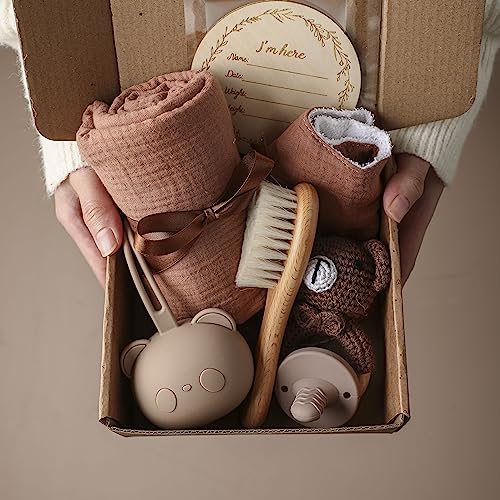

Baby Gift Set for Newborn New Baby Gift Set - Newborn Baby Essentials Baby Bath Set with Baby Blanket Baby Rattle - New Born Baby Girls Gift & Baby Boy Gifts for Baby Shower


Organic Burp Cloths for Baby Boys and Girls - 5-Pack Super Absorbent Burping Cloth, Burp Clothes, Soft & Plush Newborn Towel, Milk Spit Up Rags, Burpy Cloth Bib for Unisex, Burping Rags(Grayscape)


Baby Shower Gifts, New Born Baby Gifts for Boys, Unique Baby Gifts Basket Essential Stuff - Baby Lovey Blanket Newborn Bibs Socks Wooden Rattle & Greeting Card, Newborn Baby Gift Set


UNIFACO Mom to Be Gift New Born Baby Essentials Must Have Infant Funny Saying Romper Clothes One Piece Bodysuits Of Course Im Cute Have You Seen My Mom


Upsmile 5 Pieces Newborn Baby Hat Cap with Big Bow Decoration Nursery Beanie


Hudson Baby Unisex Baby Cotton Headband and Scratch Mitten Set, dots, 0-6 Months


iAOVUEBY Baby Girl Gifts, Baby Shower Gifts for Girls, Unique Baby Gift Essential Stuff Newborn Swaddle Wrap Sunglasses Infant Bow Onesie Milestone Cards Tassel Shoes, New Born Baby Girl Gift Basket


The Peanutshell Baby Layette Set for Girls, New Born Baby Essentials Must Haves, New Baby Girl Gifts 0-3 Months, 30 Pieces


Onesies Brand Unisex Baby 12-Piece Cap and Mitten Set, Tiger Board, Newborn US
Bracey Update
Bracey had a terrific week. He weighed 3.300 kilos at his doctor’s appointment on Wednesday and was told he did not need to come back for two weeks.
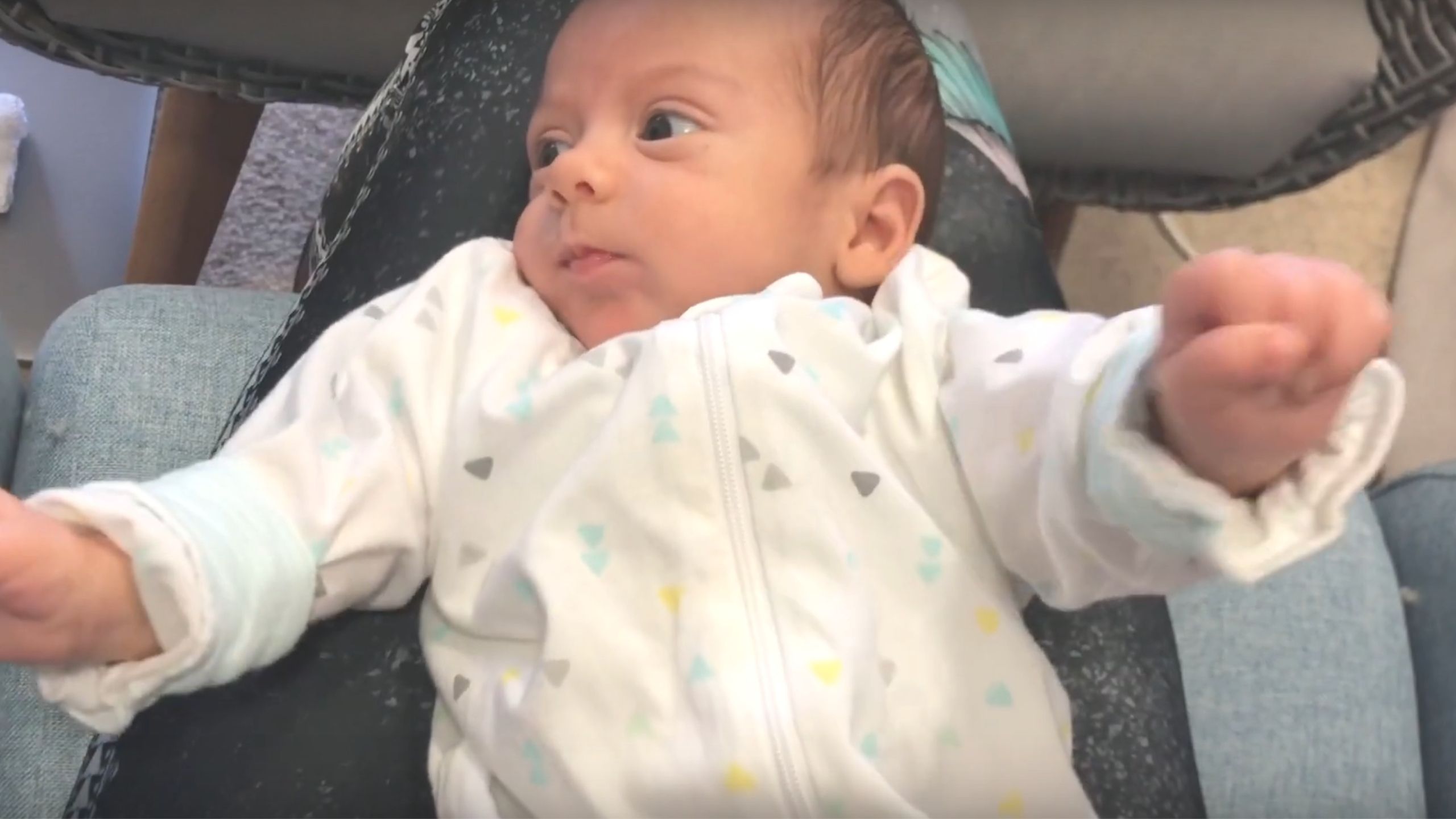

He enjoyed hugs and kisses. He did some Tummy Time with Daddy. And he enjoyed some comfortable rides in his new baby swing.


His biggest struggle for the past few weeks has been constipation. The doctor recommended massage and glycerine suppositories which we have been trying out, but it’s still been tough going. I’m beginning to scrutinize my own diet, wondering if the soy milk I put in coffee is affecting Bracey. If anyone has thoughts in that regard, chime in because I’d love to hear about your experience.
Thanks so much for reading and watching and see you back soon for Month 4 with your baby!
Melissa
Resources
WebMD
Parents.com
Whattoexpect.com




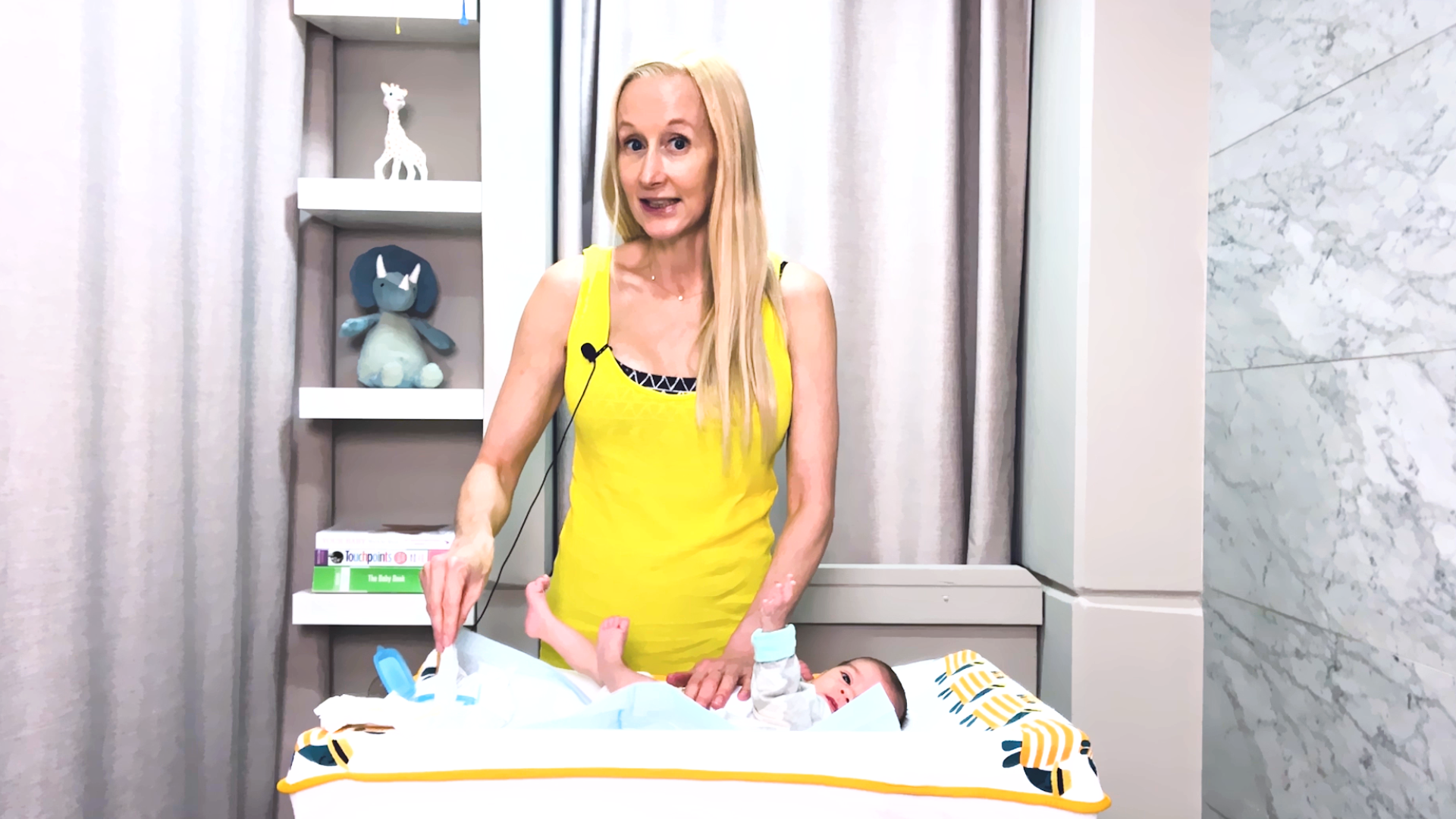
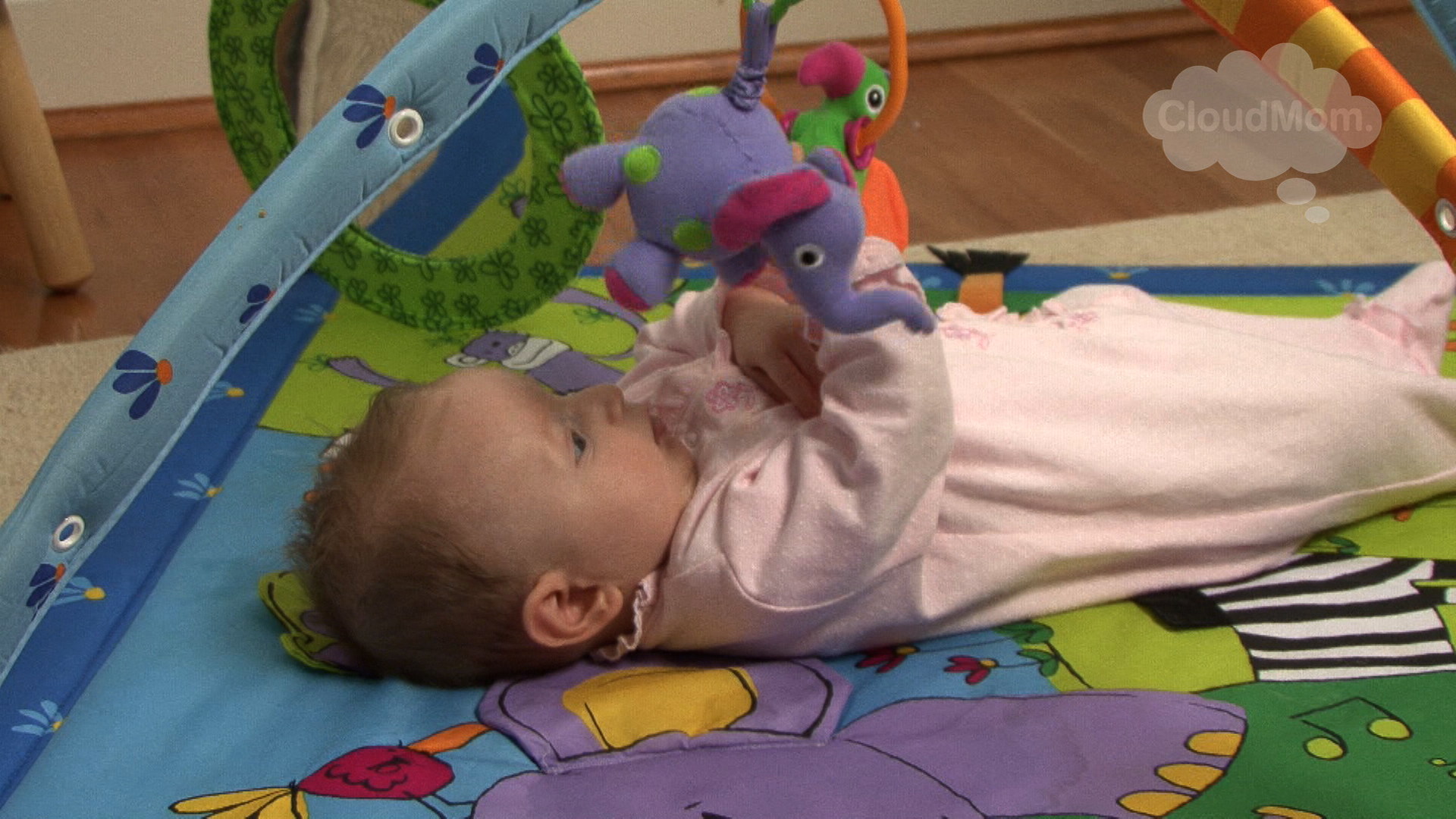
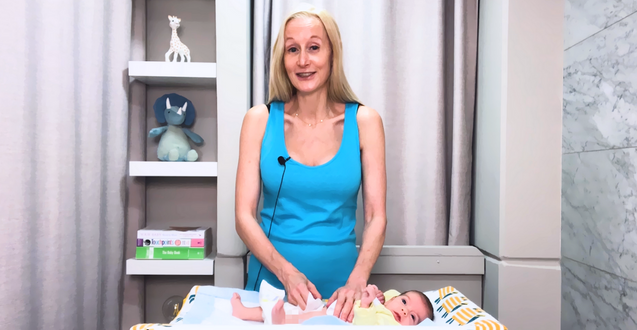


Comments